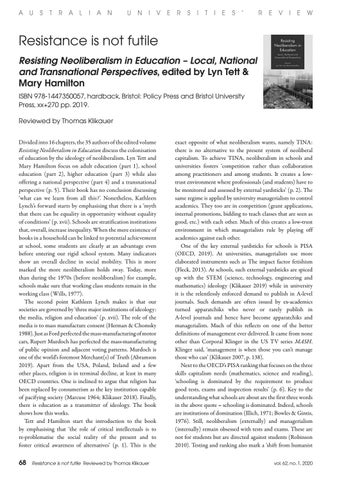A
U
S
T
R
A
L
I
A
N
U
N
I
V
E
R
S
I
T
I
E
S
’
R
E
V
I
E
W
Resistance is not futile Resisting Neoliberalism in Education – Local, National and Transnational Perspectives, edited by Lyn Tett & Mary Hamilton ISBN 978-1447350057, hardback, Bristol: Policy Press and Bristol University Press, xx+270 pp. 2019. Reviewed by Thomas Klikauer Divided into 16 chapters, the 35 authors of the edited volume Resisting Neoliberalism in Education discuss the colonisation of education by the ideology of neoliberalism. Lyn Tett and Mary Hamilton focus on adult education (part 1), school education (part 2), higher education (part 3) while also offering a national perspective (part 4) and a transnational perspective (p. 5). Their book has no conclusion discussing ‘what can we learn from all this?’. Nonetheless, Kathleen Lynch’s forward starts by emphasising that there is a ‘myth that there can be equality in opportunity without equality of conditions’ (p. xvii). Schools are stratification institutions that, overall, increase inequality. When the mere existence of books in a household can be linked to potential achievement at school, some students are clearly at an advantage even before entering our rigid school system. Many indicators show an overall decline in social mobility. This is more marked the more neoliberalism holds sway. Today, more than during the 1970s (before neoliberalism) for example, schools make sure that working class students remain in the working class (Wills, 1977). The second point Kathleen Lynch makes is that our societies are governed by ‘three major institutions of ideology: the media, religion and education’ (p. xvii). The role of the media is to mass manufacture consent (Herman & Chomsky 1988). Just as Ford perfected the mass-manufacturing of motor cars, Rupert Murdoch has perfected the mass-manufacturing of public opinion and adjacent voting patterns. Murdoch is one of the world’s foremost Merchant(s) of Truth (Abramson 2019). Apart from the USA, Poland, Ireland and a few other places, religion is in terminal decline, at least in many OECD countries. One is inclined to argue that religion has been replaced by consumerism as the key institution capable of pacifying society (Marcuse 1964; Klikauer 2018). Finally, there is education as a transmitter of ideology. The book shows how this works. Tett and Hamilton start the introduction to the book by emphasising that ‘the role of critical intellectuals is to re-problematise the social reality of the present and to foster critical awareness of alternatives’ (p. 1). This is the
68
Resistance is not futile Reviewed by Thomas Klikauer
exact opposite of what neoliberalism wants, namely TINA: there is no alternative to the present system of neoliberal capitalism. To achieve TINA, neoliberalism in schools and universities fosters ‘competition rather than collaboration among practitioners and among students. It creates a lowtrust environment where professionals (and students) have to be monitored and assessed by external yardsticks’ (p. 2). The same regime is applied by university managerialists to control academics. They too are in competition (grant applications, internal promotions, bidding to teach classes that are seen as good, etc.) with each other. Much of this creates a low-trust environment in which managerialists rule by playing off academics against each other. One of the key external yardsticks for schools is PISA (OECD, 2019). At universities, managerialists use more elaborated instruments such as The impact factor fetishism (Fleck, 2013). At schools, such external yardsticks are spiced up with the STEM (science, technology, engineering and mathematics) ideology (Klikauer 2019) while in university it is the relentlessly enforced demand to publish in A-level journals. Such demands are often issued by ex-academics turned apparatchiks who never or rarely publish in A-level journals and hence have become apparatchiks and managerialists. Much of this reflects on one of the better definitions of management ever delivered. It came from none other than Corporal Klinger in the US TV series MASH. Klinger said, ‘management is when those you can’t manage those who can’ (Klikauer 2007, p. 138). Next to the OECD’s PISA ranking that focuses on the three skills capitalism needs (mathematics, science and reading), ‘schooling is dominated by the requirement to produce good tests, exams and inspection results’ (p. 6). Key to the understanding what schools are about are the first three words in the above quote – schooling is dominated. Indeed, schools are institutions of domination (Illich, 1971; Bowles & Gintis, 1976). Still, neoliberalism (externally) and managerialism (internally) remain obsessed with tests and exams. These are not for students but are directed against students (Robinson 2010). Testing and ranking also mark a ‘shift from humanist vol. 62, no. 1, 2020
